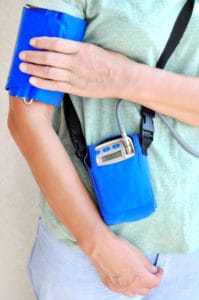Ambulatory BP Monitoring
An ambulatory blood pressure monitor will obtain a series of blood pressure readings during the monitoring period (usually 24 hours), which will allow the doctor to determine whether a patient’s blood pressure is consistently high enough to require treatment. If a patient is already on medication for blood pressure, the 24 hour monitor will help the doctor to assess how well these drugs are working and whether any changes need to be made.
A blood pressure cuff will be fitted to the non-dominant arm, and a cable will connect this to a portable recorder worn on a belt around the waist. The monitor is programmed to take the blood pressure twice an hour during the daytime, and once an hour at night. When the cuff inflates, the patient should straighten the arm and try to remain as still as possible until the reading is complete.
Patients are asked to go about all their daily activities as usual, with the exception of swimming, bathing and showering, until the 24 hour period has come to an end (care should be taken to avoid getting the equipment wet). Patients are asked to keep a note of any significant activities undertaken or symptoms experienced during the monitoring period, so that any relationship between these and the blood pressure can be identified. It is also useful for the patient to note exactly when they went to bed and got up, so that accurate day and night time profiles can be generated.

Related links:
Conditions - High Blood Pressure
Blood pressure is the pressure exerted on the walls of the arteries when the heart pumps; the term “systolic” is the top reading on a blood pressure monitor and relates to the maximum pressure exerted on the artery when the heart contracts, and the term “diastolic” is the bottom number and is the minimum pressure exerted on the artery when the heart relaxes. Read more
Conditions - PoTS
PoTS is a condition which affects the autonomic nervous system, the system responsible for regulating the involuntary processes which take place in the body such as breathing and digestion. Read more
Tests - Autonomic Testing
The autonomic nervous system controls the automatic functions of the body, such as heart rate, gut motility, pupil size and sweating. Read more
Tests - Echocardiography
Echocardiography is the study of the heart using ultrasound. Similar to a scan of a baby undertaken during pregnancy, an ultrasound probe applied to the chest wall can be used to study the heart. Read more
Medical Therapy - High Blood Pressure
There is a degree of discord internationally regarding the thresholds for treatment, and the UK guidelines do differ slightly from their European and American counterparts. Read more